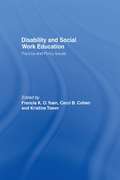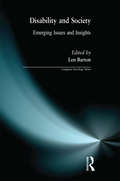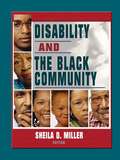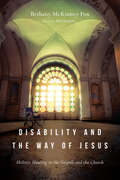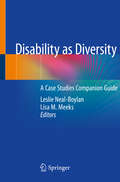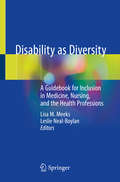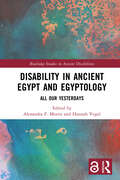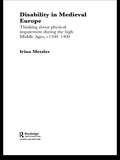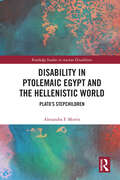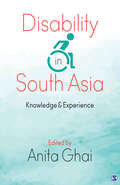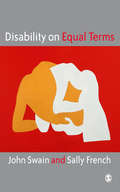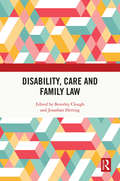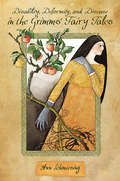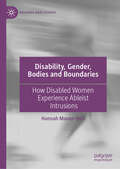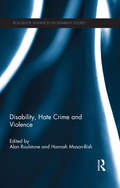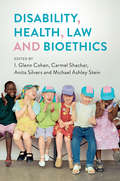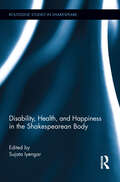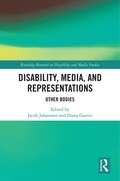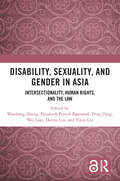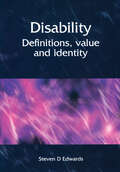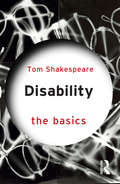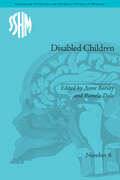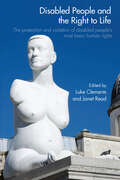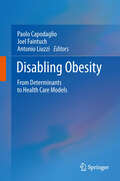- Table View
- List View
Disability and Social Work Education: Practice and Policy Issues
by Francis K. O. Yuen Carol B. Cohen Kristine TowerBridging the chasm between the disabled and a just and fair society takes skill, dedication, and a deep understanding of the issues. Disability and Social Work Education: Practice and Policy Issues presents leading social work experts providing insightful, effective strategies to address the current gaps in the system between social work and those individuals with disabilities. Diverse perspectives on all levels of social work practice are integrated with the basic tenets of social justice, accessibility to services, and human rights. Specific challenges and issues are addressed in work with disabled populations. Disability and Social Work Education: Practice and Policy Issues examines the social construction of disability that connotes inferiority and highlights practical strategies for change. This creative resource gives social work educators, students, and practitioners the opportunity to embrace diverse and creative ways for integrating a generalist social work model in their work with various size systems that are related to disability. Chapters include extensive references, appendixes, tables, and figures to clearly illustrate topics. Topics in Disability and Social Work Education: Practice and Policy Issues include: model curriculum on disabilities that incorporates diverse perspectives of social work practice with individuals who have physical, cognitive, and psychiatric disabilities protecting the legal rights of children and the Individuals with Disabilities Education Act (IDEA) empowering disabled individuals for civil rights to have access to community living the academic process of helping students who are disabled achieve their academic goals components of the Americans with Disabilities Act—and key decisions made by the Supreme Court strategies of intervention for macro change historical overview of family policy and practice as it relates to children and adolescents who are disabled the biopsychosocial framework as an assessment tool to develop interventions the use of the therapeutic relationship and psychodynamic and ecological approaches to social work practices helping clients with disabilities develop adaptive religious and spiritual beliefs disability protests and movements and their implications on social work practice the Capacity Approach and the International Classification of Functioning, Disability and Health as social work tools basic guidelines for undertaking research about and with people who have disabilities Disability and Social Work Education: Practice and Policy Issues is a valuable, unique resource for social work educators, students, and practitioners.
Disability and Society: Emerging Issues and Insights (Longman Sociology Series)
by Len BartonThe study of disability has traditionally been influenced mainly by medical and psychological models. The aim of this new text, Disability and Society, is to open up the debate by introducing alternative perspectives reflecting the increasing sociological interest in this important topic.Disability and Society brings together for the first time some of the most recent original research in this rapidly expanding area. The contributors, both disabled and non-disabled, are all leading thinkers in their field and suggest new ways of understanding disability, developing policy and challenging current practice.
Disability and the Black Community
by Sheila D MillerIncrease your awareness of the concerns facing the black disabled community! Disability and the Black Community addresses physical, mental, and learning disabilities experienced across age, gender, and ethics groups by the black race in the United States. This unique book works to increase understanding and awareness of those working with the disabled by mobilizing advocates, providing alternatives for successful intervention and planning, and encouraging research in disability and rehabilitation. A distinguished panel of researchers and practitioners provide commentary on topics that include selected physical disabilities, disabled children learning and program concerns, welfare reform, public housing issues, domestic violence, and disability curriculum content-all in accordance with the broadening of the definition of disability as supported by the American Disabilities Act. Disability and the Black Community raises the level of understanding and awareness of the complex and diverse concerns facing the disabled and their families in the community and the workplace. The book is at once motivational, influential, and empowering, examining social and political issues that compound the ordeals confronting the black disabled. Topics addressed include: learning disabilities, academic achievements, and mental health issues of children health disparities and access to care welfare reform, disability, and race practice, program, and curriculum models and much more! Disability and the Black Community is an essential resource for health professionals and advocates who work with the black disabled. The book keeps practitioners up to date on what is needed in terms of funding, facilities, and resources in order to keep the larger society and significant resource systems appraised of the needs of the disabled.
Disability and the Way of Jesus: Holistic Healing in the Gospels and the Church
by Bethany McKinney FoxWhat does healing mean for people with disabilities? The Gospels are filled with accounts of Jesus offering physical healing. But even as churches today seek to follow the way of Jesus, people with disabilities all too often experience the very opposite of healing and life-giving community: exclusion, judgment, barriers. Misinterpretation and misapplication of biblical healing narratives can do great damage, yet those who take the Bible seriously mustn't avoid these passages either. Bethany McKinney Fox believes that Christian communities are better off when people with disabilities are an integral part of our common life. In Disability and the Way of Jesus, she considers how the stories of Jesus' healings can guide us toward mutual thriving. How did Jesus' original audience understand his works of healing, and how should we relate to these texts today? After examining the healing narratives in their biblical and cultural contexts, Fox considers perspectives from medical doctors, disability scholars, and pastors to more fully understand what Jesus does as he heals and how he points the way for relationships with people with disabilities. Personal reflections from Christians with disabilities are featured throughout the book, which concludes with suggestions for concrete practices adaptable to a variety of church settings. Bridging biblical studies, ethics, and disability studies with the work of practitioners, Fox provides a unique resource that is both theologically grounded and winsomely practical. Disability and the Way of Jesus provides new lenses on holistic healing for scholars, laypeople, and ministry leaders who care about welcoming all people as Jesus would.
Disability as Diversity: A Case Studies Companion Guide
by Leslie Neal-Boylan Lisa M. MeeksAdministrators in medical, nursing and health science programs are witnessing a substantial increase in the number of students with disabilities entering their programs. Concurrently, the benefits of diversity in healthcare are becoming increasingly apparent and important. A commitment to disability inclusion for qualified students should be a high-level goal of nursing, medical, and other health science programs. To support this goal, leaders in these areas must develop robust programs and an understanding of the needs of qualified students with disabilities in the health sciences and accompanying best practices for inclusion. This book of case studies is the perfect companion to Meeks' and Neal-Boylan's recently-published book Disability as Diversity. It contains ten cases related to medicine and nursing but with significant relevance to other health professions. Each case is preceded by an introduction with instructions on how to use it. The cases are followed by discussion questions and perspectives from the student, faculty and disability resource professional viewpoints. The cases are then deconstructed with reference to the book Disability as Diversity, relevant citations from the literature and case law. Developed by some of the most notable researchers and clinicians in the field this case book serves as truly invaluable resource for deans, program directors, faculty and student affairs personnel. Offices can use these cases as a platform for critical discussion and training about disability processes, policies and decision-making regarding accommodations and inclusion.
Disability as Diversity: A Guidebook for Inclusion in Medicine, Nursing, and the Health Professions
by Leslie Neal-Boylan Lisa M. MeeksAdministrators and faculty in medical, nursing and health science programs are witnessing a substantial increase in the number of students with disabilities entering their programs. Concurrently, the benefits of diversity in healthcare are becoming increasingly apparent and important. Provider-patient concordance is a known mechanism for reducing health care disparities. By developing a workforce that mirrors the patient population, we can appropriately inform disability care, reducing health care disparities while embracing the tenets of the Americans With Disabilities Act (ADA), namely equal opportunity, full participation, independent living, and economic self-sufficiency for qualified individuals with disabilities. One in five individuals will experience disability at some point in their lives, making this the largest minority in the US. A commitment to disability inclusion for qualified students should be a high-level goal of nursing, medical, and other health science programs. To support this goal, leaders in these areas must develop robust programs and an understanding of the best practices for inclusion. This first-of-its-kind title is designed to help deans, program directors, faculty, student affairs personnel and disability resource professionals thoughtfully plan for the growing population of health-care professionals with disabilities. The content helps stakeholders contextualize disability inclusion in health-care education as a function of social justice and a mechanism of reducing health care disparities for patients. It offers pragmatic advice, grounded in research, best practice, and case law to address the highly nuanced approach to determining and implementing accommodations in a high-stakes clinical environment. Disability as Diversity connects the moving parts necessary to ensure equal access for qualified students and provides a blueprint for crafting policy, proactive messaging, improving climate, adhering to accreditation standards, addressing licensing and board exams, responding to student failure, all while remaining compliant with the Americans with Disabilities Act (ADA), and applicable Federal regulations. This text provides educators with the perspectives and skills they need to bring disability inclusion to the forefront of health education.
Disability in Ancient Egypt and Egyptology: All Our Yesterdays (Routledge Studies in Ancient Disabilities)
by Alexandra F. Morris Hannah VogelThis book explores disability across time and space—from ‘ancient Egypt’ as a culture to Egyptology as a contemporary field—to go beyond simply identifying disability, encouraging readers to thoughtfully consider the history of disabled people in ancient Egypt and Egyptology.Through a critical investigation, this volume reshapes often-overlooked narratives of disability within the discipline of Egyptology and Egyptian Archaeology. Chapters explore evidence of disability, the historiographical ways in which disability has been approached, and how disability histories are (mis)represented in various contemporary spaces. Coverage stretches across Egypt and Nubia from the Predynastic to the Roman periods, as well as receptions of these cultures and disability in museums. Its editors and many of its authors are disability community members who are experts in their respective professions, comprising an international authorship and including voices from typically underrepresented groups. Contributors range from early career researchers to senior scholars, as well as those working outside of and adjacent to academia. While focusing on ancient Egypt and Egyptology, this volume offers new ways to consider disability in the broadest possible sense. It uses terminology informed by the disability community and offers guidance for disability inclusivity in curatorial and pedagogical museum and university contexts. It prioritises disability as an essential area of research in ancient world studies, and platforms both ancient and modern disabled voices. The deep, detailed exploration into disability in the past and in our discipline offered by this book inspires readers to further explore and appreciate the infinite diversity of the human experience in all its infinite combinations.The first-book length treatment of the subject, Disability in Ancient Egypt and Egyptology provides a much-needed resource for students and scholars of ancient Egypt, Egyptology, and disability in the ancient world. It is also suitable for researchers in Disability Studies, practitioners in broader ancient world studies, and museum and heritage professionals. Chapter 1 of this book is freely available as a downloadable Open Access PDF at http://www.taylorfrancis.com under a Creative Commons Attribution-Non Commercial-No Derivatives 4.0 license.
Disability in Judaism, Christianity, and Islam
by Darla Schumm Michael StoltzfusThis edited collection of essays critically examines how diverse religions of the world represent, understand, theologize, theorize and respond to disability and/or chronic illness. Contributors employ a wide variety of methodological approaches including ethnography, historical, cultural, or textual analysis, personal narrative, and theological/philosophical investigation.
Disability in Medieval Europe: Thinking about Physical Impairment in the High Middle Ages, c.1100–c.1400 (Routledge Studies in Medieval Religion and Culture)
by Irina MetzlerThis impressive volume presents a thorough examination of all aspects of physical impairment and disability in medieval Europe. Examining a popular era that is of great interest to many historians and researchers, Irene Metzler presents a theoretical framework of disability and explores key areas such as: medieval theoretical concepts theology and natural philosophy notions of the physical body medical theory and practice. Bringing into play the modern day implications of medieval thought on the issue, this is a fascinating and informative addition to the research studies of medieval history, history of medicine and disability studies scholars the English-speaking world over.
Disability in Ptolemaic Egypt and the Hellenistic World: Plato’s Stepchildren (Routledge Studies in Ancient Disabilities)
by Alexandra F. MorrisThis is one of the first single-authored books to utilise Critical Disability Studies and the lens of embodiment to comprehensively unveil, explore, and celebrate disability in Ptolemaic Egypt and the Hellenistic world through a critical examination of art, artefacts, texts, and human remains.Through a thoughtful investigation, this volume reveals often-overlooked narratives of disability within Ptolemaic Egypt and the larger Hellenistic world (332 BCE to 30 BCE). Chapters explore evidence of physical and intellectual disability, ranging from named individuals; representations of people and mythological figures with dwarfism, blindness and vision impairments; cerebral palsy; mobility impairments; spinal disability; and medicine, healing, and prosthetics. Morris examines the historiographical ways in which disability has been approached, and how ancient disability histories are (mis)represented in various contemporary spaces. It uses terminology informed by the disability community and offers guidance for disability inclusivity in curatorial and pedagogical museum and university contexts, as well as prioritizing disability as an essential area of research in ancient world studies and assisting readers with the identification of ancient disability artefacts.The first-book length treatment of the subject, Disability in Ptolemaic Egypt and the Hellenistic World provides a much-needed resource for students and scholars of ancient Egypt, Egyptology, Classics, Classical Studies, and disability in the ancient world. It is also suitable for researchers in Disability Studies, practitioners in broader Ancient World Studies, and museum and heritage professionals. It is accessible to disabled people curious about their own history, as well as nondisabled people interested in disability history and those interested in a more accurate view of ancient Egyptian history.
Disability in South Asia: Knowledge and Experience
by Anita GhaiDisability in South Asia: Knowledge & Experience presents a comprehensive approach to various aspects of disability in South Asia. A critical work on disability studies, this book explores the full complexity of disability in its multi-layered, interactional dynamics. The book imparts understanding of the social, political and cultural construction of disability as opposed to the traditional perception of disability in terms of medical condition, biological trait, rehabilitation and special education. It focuses on foregrounding disability across various areas including education, law and sociology, critically exploring the interaction of gender and disability, and challenging the separation between theory and practice as well as academia and activism. The book shows how the inclusion of a disability perspective enriches scholarship by contributing to the understanding of social marginalization, oppression and the perception of difference. It highlights the lived experiences of people with disabilities to help readers develop a nuanced comprehension of disability.
Disability on Equal Terms
by John Swain Sally French'Disability on Equal Terms is not a Turgid and difficult book despite its accent on complex and challenging themes. It is a lively and important read' - The Skill Journal, June 2009 `[A] collection of highly readable and scholarly essays that reflect both the theoretical and practical implications of recent developments in the field. This book is essential reading for everyone interested in disability: highly recommended' - Colin Barnes, Centre for Disability Studies, University of Leeds This authoritative collection of writings examines and challenges traditional notions of disability. Edited and written by leading experts in the field, it offers a multidisciplinary approach to disability studies, incorporating perspectives from a wide range of health and social care services, as well as a distinct and unique emphasis on the views, experiences, work and personal testimonies of disabled people themselves. The book is divided into three sections, each of which is prefaced by an editorial introduction which brings together the key themes and issues under discussion. Each section: " Examines the dominant assumptions about disability and impairment and their historical and cultural contexts " Documents the challenges to such presumptions generated by disabled people themselves " Explores the implications of such challenges for professional policy and practice This ground-breaking book will be essential reading for those studying disability studies, social work, nursing, and allied health and social care at all levels. It will also be a thought-provoking and inspiring read for disabled people and activists, professionals and policy makers. John Swain is based in the School of Health, Community and Education Studies at Northumbria Univeristy. Sally French is based at the Open Univeristy. Previous publications include the co-edited Disabling Barriers, Enabling Environments, Second Edition (SAGE, 2004).
Disability, Care and Family Law
by Jonathan Herring Beverley CloughThis book explores the series of issues that emerge at the intersection of disability, care and family law. Disability studies is an area of increasing academic interest. In addition to a subject in its own right, there has been growing concern to ensure that mainstream subjects diversify and include marginalised voices, including those of disabled people. Family law in modern times is often based on an "able-bodied autonomous norm" but can fit less well with the complexities of living with disability. In response, this book addresses a range of important and highly topical issues: whether care proceedings are used too often in cases where parents have disabilities; how the law should respond to children who care for disabled parents – and the care of older family members with disabilities. It also considers the challenges posed by the UN Convention on the Rights of Persons with Disabilities, particularly around the different institutional and state responsibilities captured in the Convention, and around decision-making for both disabled adults and children. This interdisciplinary collection – with contributors from law, criminology, sociology and social policy as well as from policy and activist backgrounds – will appeal to academic family lawyers and disability scholars as well as students interested in issues around family law, disability and care.
Disability, Deformity, and Disease in the Grimms' Fairy Tales
by Ann SchmiesingAlthough dozens of disabled characters appear in the Grimms' Children's and Household Tales, the issue of disability in their collection has remained largely unexplored by scholars. In Disability, Deformity, and Disease in the Grimms' Fairy Tales, author Ann Schmiesing analyzes various representations of disability in the tales and also shows how the Grimms' editing (or "prostheticizing") of their tales over seven editions significantly influenced portrayals of disability and related manifestations of physical difference, both in many individual tales and in the collection overall. Schmiesing begins by exploring instabilities in the Grimms' conception of the fairy tale as a healthy and robust genre that has nevertheless been damaged and needs to be restored to its organic state. In chapter 2, she extends this argument by examining tales such as "The Three Army Surgeons" and "Brother Lustig" that problematize, against the backdrop of war, characters' efforts to restore wholeness to the impaired or diseased body. She goes on in chapter 3 to study the gendering of disability in the Grimms' tales with particular emphasis on the Grimms' editing of "The Maiden Without Hands" and "The Frog King or Iron Henry." In chapter 4, Schmiesing considers contradictions in portrayals of characters such as Hans My Hedgehog and the Donkey as both cripple and "supercripple"--a figure who miraculously "overcomes" his disability and triumphs despite social stigma. Schmiesing examines in chapter 5 tales in which no magical erasure of disability occurs, but in which protagonists are depicted figuratively "overcoming" disability by means of other personal abilities or traits. The Grimms described the fairy tale using metaphors of able-bodiedness and wholeness and espoused a Romantic view of their editorial process as organic restoration. Disability, Deformity, and Disease in the Grimms' Fairy Tales shows, however, the extent to which the Grimms' personal experience of disability and illness impacted the tales and reveals the many disability-related amendments that exist within them. Readers interested in fairy-tales studies and disability studies will appreciate this careful reading of the Grimms' tales.
Disability, Gender, Bodies and Boundaries: How Disabled Women Experience Ableist Intrusions (Palgrave Hate Studies)
by Hannah Mason-BishThis book outlines the ways that disabled women experience unwanted touching and intrusive questions when navigating public space. Using the framework of feminist disability studies, this book takes an intersectional approach to fill a gap in the understanding of how disability and gender are factors in the nature and impacts of unwanted touching. It draws on research from over 70 women and non-binary people to elicit stories and examples, with some people living what some described as a ‘smaller life’. The methodology was a co-production with a disability activist. This book develops the new concept of Ableist Intrusions to investigate the nature and impacts of such experiences. It considers how non-disabled people should interact with disabled people in order to respect boundaries and bodies.
Disability, Hate Crime and Violence (Routledge Advances in Disability Studies)
by Alan Roulstone Hannah Mason-BishThis book provides a comprehensive and interdisciplinary examination of disability, hate crime and violence, exploring its emergence on the policy agenda. Engaging with the latest debates in criminology, disability and violence studies, it goes beyond conventional notions of hate crime to look at violences in their myriad forms as they are seen to impact upon disabled people’s lives. Despite a raft of relevant policy and legislation, few have attempted to draw together research on the disabled as victims of hate crime and violence. This innovative volume conceptualizes issues of disability, hate crime and violence and connects empirical research with theoretical insights. Making links between criminal justice policy, social care and welfare, it highlights areas of best practice and makes suggestions for policy and legislative reform. Disability, Hate Crime and Violence is written in accessible language, with minimal jargon and an international focus. Each chapter is grounded in research and practice, with relevant policy and legislation clearly signposted throughout. Disability, Hate Crime and Violence provides a much needed theoretical and practical investigation of the key issues around disabled hate crime and violence. It is an important work for students and academics researching and studying in disability studies, criminology, social policy and sociology, as well as those with an interest in domestic violence studies and broader historical and philosophical constructions of disability, violence and social harms.
Disability, Health, Law, and Bioethics
by Anita Silvers I. Glenn Cohen Michael Ashley Stein Carmel ShacharHistorically and across societies people with disabilities have been stigmatized and excluded from social opportunities on a variety of culturally specific grounds. In this collection, the authors explore the impact that the philosophical framing of disability can have on public policy questions, in the clinic, in the courtroom, and elsewhere. They examine the implications of this understanding for legal and policy approaches to disability, strategies for allocating and accessing health care, the implementation of the Americans with Disabilities Act, health care rights, and other legal tools designed to address discrimination. This volume should be read by anyone seeking a balanced view of disability and an understanding of the connection between the framing of disability and policies that have a real-world impact on individuals.
Disability, Health, and Happiness in the Shakespearean Body (Routledge Studies in Shakespeare)
by Sujata IyengarThis book considers early modern and postmodern ideals of health, vigor, ability, beauty, well-being, and happiness, uncovering and historicizing the complex negotiations among physical embodiment, emotional response, and communally-sanctioned behavior in Shakespeare's literary and material world. The volume visits a series of questions about the history of the body and how early modern cultures understand physical ability or vigor, emotional competence or satisfaction, and joy or self-fulfillment. Individual essays investigate the purported disabilities of the "crook-back" King Richard III or the "corpulent" Falstaff, the conflicts between different health-care belief-systems in The Taming of the Shrew and Hamlet, the power of figurative language to delineate or even instigate puberty in the Sonnets or Romeo and Juliet, and the ways in which the powerful or moneyed mediate the access of the poor and injured to cure or even to care. Integrating insights from Disability Studies, Health Studies, and Happiness Studies, this book develops both a detailed literary-historical analysis and a provocative cultural argument about the emphasis we place on popular notions of fitness and contentment today.
Disability, Media, and Representations: Other Bodies (Routledge Research in Disability and Media Studies)
by Jacob Johanssen Diana GarrisiBringing together scholars from around the world to research the intersection between media and disability, this edited collection aims to offer an interdisciplinary exploration and critique of print, broadcast and online representations of physical and mental impairments.Drawing on a wide range of case studies addressing how people can be ‘othered’ in contemporary media, the chapters focus on analyses of hateful discourses about disability on Reddit, news coverage of disability and education, media access of individuals with disabilities, the logic of memes and brain tumour on Twitter, celebrity and Down Syndrome on Instagram, disability in TV drama, the metaphor of disability for the nation; as well as an autoethnography of treatment of breast cancer. Providing a much-needed global perspective, Disability, Media, and Representations examines the relationship between self-representation and representations in either reinforcing or debunking myths around disability, and ways in which academic discourse can be differently articulated to study the relationship between media and disability. This book will be of interest to students and researchers of disability studies and media studies as well as activists and readers engaged in debates on diversity, inclusivity and the media.
Disability, Sexuality, and Gender in Asia: Intersectionality, Human Rights, and the Law
by Wanhong Zhang, Elisabeth Perioli Bjørnstøl, Peng Ding, Wei Gao, Hanxu Liu and Yijun LiuThis book introduces experiential knowledge of the intersectionality of disability, sexuality, and gender equality issues. Scholars and disabled persons’ organizations in different Asian countries such as China, Vietnam, Myanmar, Nepal, and Japan have contributed to the book. It is a preliminary introduction of the frontline practice of Asian disability activism and the experience of women and LGBTIQ people with disabilities. It presents the direct participation of disability advocates in mapping how both women with disabilities and LGBTIQ individuals with disabilities realize their rights such as identity, work rights, personal safety, and sexual rights. Studies presented here explore the experience of empowering diverse disability groups and advocating for equality and non-discrimination. It explains how to use the leverage of the Convention on the Rights of Persons with Disabilities (CRPD) for further human rights campaigns in a broader context for disadvantaged groups. This collection is the product of a participatory research project, which aims to increase the capabilities of local disabled persons’ organizations and NGOs in utilizing human rights laws and encourage dialogue and collaboration between academia, people with disabilities, and human rights advocates. It will be essential reading for academics, researchers, policy-makers, and campaign groups.
Disability: Definitions, Value and Identity
by M. BonnerWhat is disability? Why terminate a pregnancy when disabling traits are diagnosed in the foetus? Can disability be part of a person’s identity? These are important questions in the current climate of increased pre-natal screening programmes designed to further reduce the numbers of children born with disabilities. This book looks at disablement from a philosophical perspective by examining these questions through a combination of critical review, discussion and narrative theory. Disability: definitions, value and identity provides practical and concise information for social care workers, counsellors, academics, students, genetics counsellors, and medical and healthcare ethicists. It will also be invaluable for disability pressure groups and policy makers.
Disability: The Basics (The Basics)
by Tom ShakespeareDisability: The Basics is an engaging and accessible introduction to disability which explores the broad historical, social, environmental, economic and legal factors which affect the experiences of those living with an impairment or illness in contemporary society. The book explores key introductory topics including: the diversity of the disability experience; disability rights and advocacy; ways in which disabled people have been treated throughout history and in different parts of the world; the daily realities of living with an impairment or illness; health, education, employment and other services that exist to support and include disabled people; ethical issues at the beginning and end of life. Disability: The Basics aims to provide readers with an understanding of the lived experiences of disabled people and highlight the continuing gaps and barriers in social responses to the challenge of disability. This book is suitable for lay people, students of disability studies as well as students taking a disability module as part of a wider course within social work, health care, sociology, nursing, policy and media studies.
Disabled Children: Contested Caring, 1850–1979 (Studies for the Society for the Social History of Medicine #8)
by Anne BorsayThis volume of essays attempts to identify the shared experiences of disabled children and examine the key debates about their care and control. The essays follow a chronological progression while focusing on the practices in a number of different countries.
Disabled People and the Right to Life: The Protection and Violation of Disabled People’s Most Basic Human Rights
by Janet Read Luke ClementsThe most basic of human rights, the right to life, is the focus of this book. 'Human rights' has increasingly come to be seen as a significant framework, both to aid understanding of the experiences of those who face oppression, and to underpin social, legal and political measures to counter it. Disabled People and the Right to Life uses this framework to explore how disabled people’s right to life is understood in different national contexts and the ways in which they are – or are not – afforded protection under the law, emphasizing the social, cultural and historical forces and circumstances which have promoted disabled people’s right to life or legitimated its violation. Written by an international panel of contributors including individuals holding public office, academics from the fields of law, social policy, disability studies and bioethics as well as practitioners and activists attempting to further disabled people’s human rights, this truly interdisciplinary book will be of interest to students and researchers of disability, law, social policy and human rights.
Disabling Obesity
by Joel Faintuch Paolo Capodaglio Antonio LiuzziObesity is currently regarded as one of the major health challenges of the developed world. Excess body weight is an important risk factor for morbidity and mortality from cardiovascular diseases, diabetes, cancer, musculoskeletal disorders and even psychiatric problems and is estimated to cause nearly 3 million deaths per year worldwide. Obesity is not necessarily associated with comorbidities: there are indeed metabolically healthy obese individuals. Thus, we need to consider individuals presenting simple with obesity separately from those at risk of developing or who have already developed complex clinical states potentially leading to disability. Comorbidities can tip the balance of independence in patients who already have functional limitations mainly due to the excess of mass itself or who develop conditions such as diabetes, cardiovascular conditions, non-alcoholic fatty liver disease, where an abnormal metabolism of adipose tissue prevails. Morbid obesity with comorbidities leading to disability represents a real social and economic burden for National Health Systems worldwide. The presence of multiple and associated comorbidities often represents an obstacle to being admitted to hospitals for the treatment of metabolic diseases. On the other hand, clinical units with optimal standards for the treatment of pathological conditions in normal-weight patients are often structurally and technologically inadequate for the care of patients with extreme obesity. The aim of this book is to focus on the pathophysiological and rehabilitative aspects of disabling obesity, highlighting multidisciplinary rehabilitation interventions as key to counteracting the disabling aspects of complicated obesity.
